Environment & Energy
Related: About this forumEurope's energy accounting conundrum
This previous thread strayed a bit from its original topic, so I decided to put up an OP devoted to one of its sub-topics, the recent energy situation in Europe. This is my attempt to unsnarl what turns out to be a surprisingly hard question to answer: "How much of Europe's energy is coming from renewable sources?"The first issue I faced is that there are a number of data sources - the EU themselves, the World Bank, and BP - all of which use different units, and employ different ways of telling the story. For this post I'm going to focus on the World Bank data, which is available as a large, comprehensive Excel spreadsheet with the EU data conveniently aggregated. At the end of the post I'll draw a couple of comparisons to some of the EU's own data that was presented in the previous thread.
The first thing to establish is how much energy the EU produces and how much it consumes (including imports). The other important datum is how much of the produced and consumed energy is in the form of electricity. This information is readily available in the WB spreadsheet, and is presented in the first graph.
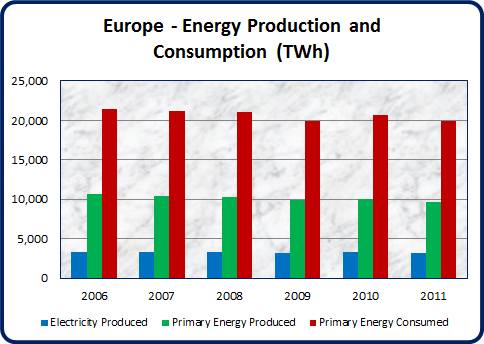
As you can see, Europe consumes about twice as much energy as it produces. Electricity makes up about 33% of the region's energy production, and about 16% of their total consumption. The proportions did not change significantly over the five most recent years available in the data set. The dip in energy use during the 2008-2009 recession is visible.
The next thing to establish is the mix of their electrical generation - what sources supply what proportion of their total electricity production. For this analysis I divided the sources into three broad categories: fossil fuels (coal, gas and oil); nuclear power; and renewables (hydro, geothermal, solar, tides, wind, biomass, and biofuels). This data was taken directly from the World Bank spreadsheet.
The next graph shows the breakdown in terawatt-hours:
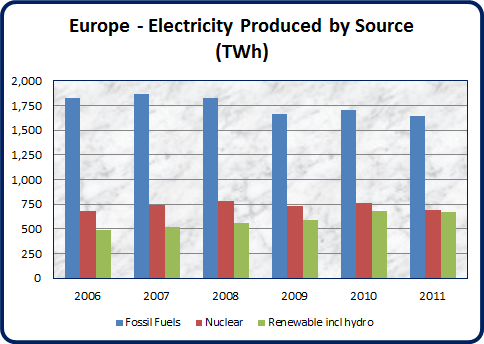
Here is the breakdown in percentages:
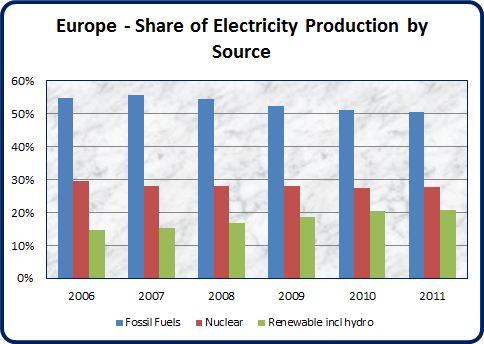
The share of electricity generated by fossil fuels fell from 55% to 50% over the period, while the share of renewables climbed from 15% to 20%. Note that nuclear power remained approximately stable, but the data set goes out only to 2011, which is before the impact of Fukushima.
Now the analysis becomes a little more interesting. I wanted to know what proportion of Europe's total primary energy production was supplied by electricity from each of these sources. Remember that primary energy includes transportation and heating fuels as well as the electricity we've been examining. Because I'm examining production only, these numbers do not include any imported fuels, just fuels sourced within the EU itself.
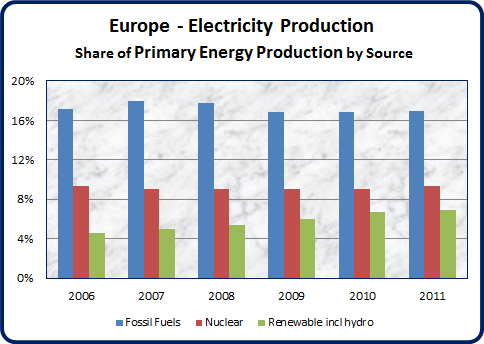
As you would expect, the contribution of each source of electricity to Europe's total primary energy production is much less than its contribution when electricity is considered alone. The proportional contribution of renewables to primary energy production rises from 4.6% in 2006 to 7% in 2011.
When we consider primary energy consumption the picture changes dramatically due to Europe's substantial consumption of imported fossil fuels.
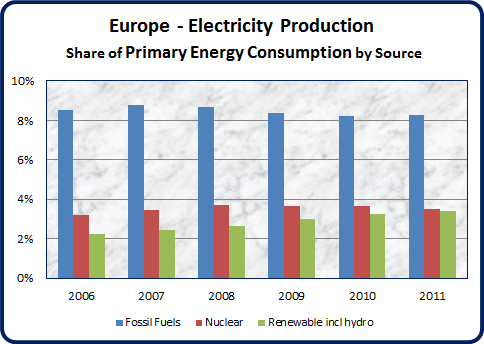
Electricity sourced from fossil fuels contributed just over 8% of Europe's primary energy consumption. Renewable energy's contribution (including hydro) rose from 2.3% of primary energy consumption in 2006 to 3.4% in 2011 - an increase of 1.1% in five years. The contribution of electricity generated by fossil fuel declined by 0.3%, while the contribution of nuclear power rose by 0.3%.
To put that in the perspective of CO2 emissions caused by energy consumption, this increase in renewable energy use should have been responsible for a 1% reduction in European CO2 emissions over those 5 years. This number correlates well to the World Bank data, which show a 0.86% reduction in emissions from 2006 to 2010 (they do not supply CO2 data past 2010) and a 0.88% reduction from 2004 to 2010. This decline represents a five-year reduction of 360 million tonnes of CO2, or one tenth of one percent of the world's emissions.
To conclude, I promised a look at some of the more contentious EU data from the previous thread. For now we'll look at two graphs:

This one shows that the EU generated about 675 TWh of electricity from renewables in 2011, which matches the World Bank data. so far, so good. The problem comes in the next graph:
http://epp.eurostat.ec.europa.eu/statistics_explained/index.php/Energy_from_renewable_sources

Figure 1: Share of energy from renewable sources in gross final consumption of energy, EU-28, 2004-2012
Clearly, their 2011 figure of 12.9% doesn't match any of the numbers I was able to generate. My analysis shows renewable-sourced electricity supplying 21% of all electricity, 7% of all primary energy produced in the EU, and 3.4% of all primary energy consumed by the EU.
The discrepancy seems to lie in their definition of "final energy consumption", which is not the same as "primary energy consumption". That definition (such as it is) can be found here:
http://epp.eurostat.ec.europa.eu/statistics_explained/index.php/Glossary:Final_energy_consumption
The definition appears to contain hidden accounting rules that drastically reduce the amount of energy against which they calculate the proportion of renewable energy consumption. In the process they seem to rely in the superficial similarity of the terms "final energy consumption"and "primary energy consumption". These are classic marketing techniques used to give casual onlookers a rosy - but utterly false -impression of the real state of affairs.
As always, the aggregate quantities of fossil fuel consumption and CO2 emissions tell the story. From the burning of 1530 million tonnes of fossil fuels in 2011, the EU emitted 3700 million tonnes of CO2. They did raise their renewable energy generation from 2006 to 2011 by 16 MTOE while reducing their nuclear generation by 7 MTOE, for a net carbon-free gain of 9 MTOE out of a total of 1662 MTOE of primary energy. However, such a minuscule change did almost nothing to reduce their actual CO2 emissions.
As far as I can tell, the EU is engaged in a massive program of renewable energy accounting flim-flam.
Luckily for them, bullshit is a renewable resource.
If anyone can resolve this discrepancy in a different way, please let me know.
GliderGuider
(21,088 posts)The bureaucrats deemed that any energy used by the energy sector itself, and all energy lost in distribution or energy transformation, isn't really energy at all, so shouldn't be counted.
With the stroke of an accountant's pen they reduced Europe's energy consumption by over a third. And they count thermal heat energy (geothermal and solar thermal) into the renewable energy category (not sure how yet). Makes renewable energy targets a lot easier to meet when you do those sorts of things...
And here I was thinking they meant "primary energy" and "electricity from renewable sources". How naive can I be? ![]()
I now understand how the EU bureaucrats got their reputation.
muriel_volestrangler
(101,321 posts)That's amazing. You could have saved yourself all that bother if you'd checked in a dictionary. But I am amazed you didn't remember the difference in meaning by yourself.
GliderGuider
(21,088 posts)FU
muriel_volestrangler
(101,321 posts)I read all the way through it, and found it was about your mistake. Would you prefer a tl;dr next time?
GliderGuider
(21,088 posts)That was one of their techniques. If it caught me, who has been looking at energy issues for some time now, how many other laypeople are likely to say, "Well, they say they're getting 15% of their energy from renewables. Good show!"
It wasn't a mistake on my part so much as the lack of one specific bit of knowledge. My initial impression was that "final use energy" meant something like "end use energy", which is the component of primary energy that does useful work. If I hadn't dug around and found an unexpected discrepancy I wouldn't have been irked enough to go looking for the actual definition of the term. And if I hadn't done that work I wouldn't have known enough to be outraged at their flim-flam. So it was a very useful exercise for me.
Sorry I strained your reading capabilities.
hunter
(38,317 posts)It's to quit using fossil fuels.
Our current economic system can't do that, and we are completely unwilling to experiment with economic systems that might be able to do that.
Ban something as ugly as fracking, as the voters of San Benito county did in reasonable fear of losing their fresh water resources, and the oil company will sue you for $1.2 Billion. http://www.democraticunderground.com/10025842403
GliderGuider
(21,088 posts)We appear to be so close to the ecological brink that we probably don't have time for substitution to work - if substitution would even work at all to reduce FF use, which I'm not at all convinced of.
Over the last 10 years the world has added 5 tonnes of new fossil fuels for every tonne of renewable energy - including hydro. The chart for fossil fuel use is linear, which means that it's tracking population growth. For every person that's added to the planet we are adding almost 3 tonnes of fossil fuel use but just over half a tonne of renewable energy. With 77 million new people coming into the world every year, this is not a recipe for success - it's a recipe for extinction.
All the accounting tricks of all the world's bureaucrats, and all the hopium of all the world's renewable energy and population-reduction activists can't alter those bald facts.
Maybe prayer would work? We sure as fuck need a miracle.